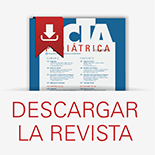Volumen 77 - Números 3 y 4 - Marzo y abril 2019
Noticias
-
Viernes, 23 Junio 2023
 Vall d’Hebron pone en marcha una consulta oncológica e integral para tratar los tumores de adolescentes y jóvenes adultos
Vall d’Hebron pone en marcha una consulta oncológica e integral para tratar los tumores de adolescentes y jóvenes adultos
-
Miércoles, 03 Marzo 2021
 El 30% de los preescolares no duerme las horas requeridas por el mal uso de dispositivos digitales
El 30% de los preescolares no duerme las horas requeridas por el mal uso de dispositivos digitales
-
Martes, 30 Junio 2020Visto bueno para Cosentyx en la psoriasis pediátrica
-
Lunes, 02 Marzo 2020El diagnóstico precoz de las enfermedades metabólicas congénitas, fundamental para evitar complicaciones
-
Jueves, 13 Febrero 2020
 Fórmulas infantiles que refuerzan el sistema inmunitario a través de la microbiota
Fórmulas infantiles que refuerzan el sistema inmunitario a través de la microbiota











